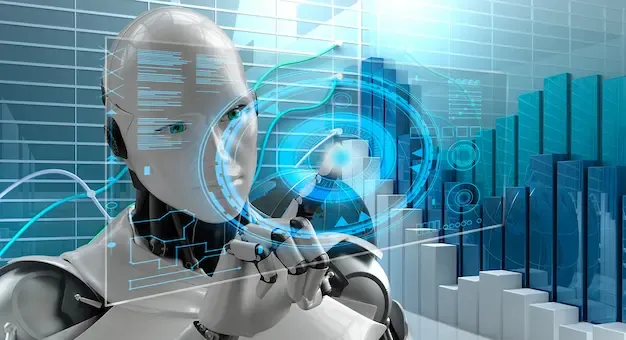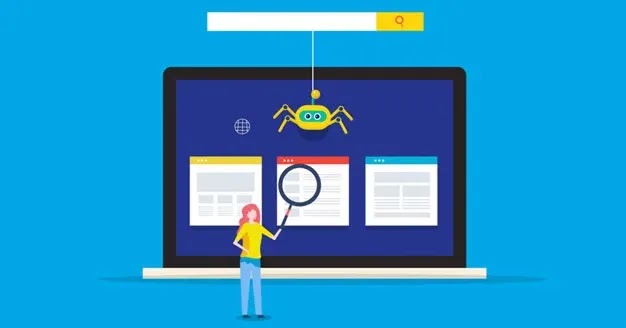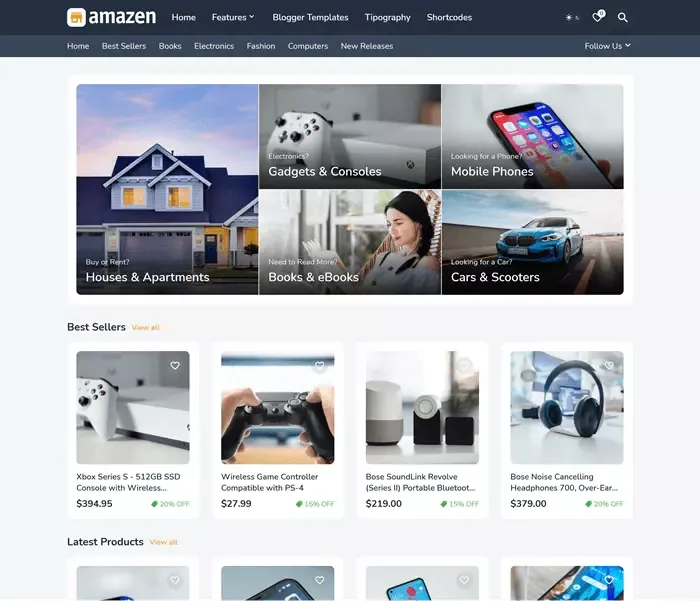AI Marketing - New Opportunities in the Marketing World
How many times have you wondered how the advertisement of the product you
are interested in reaching you at the right time for shopping? And no, it's no
coincidence that this morning you were delighted by the advertisement with a
discount on a laptop for which you have been collecting money for a long time.
Have you heard of the term AI marketing?
Marketers know that behind
this "magic" is a whole system of tools and programs in which artificial
intelligence is woven.
What is Artificial Intelligence (AI)?
Before we continue, it would be appropriate to get acquainted with the
very term artificial intelligence.
Although it is ubiquitous today
and makes our lives easier almost every day, we often associate the term
"artificial intelligence" with only some of its applications. So it becomes
synonymous with big projects like autopilot and cyborgs, forgetting that it is
an integral part of thousands of tools and applications that work quietly
behind the scenes, making our lives simpler.
How does AI work?
Artificial intelligence is a subfield of computing that uses computer
systems to simulate the process of human intelligence.
It works on
the principle of algorithms that find and extract relations and established
patterns in large data sets. Based on this information, algorithms conclude
and make predictions.
This automates the learning and
decision-making process, which greatly improves efficiency and performance,
and it is no wonder that an increasing number of industries use AI, both in
solving those less interesting repetitive business activities and those
complex ones that require accuracy and timeliness.
As marketing is
one of the essential areas of business, the introduction of artificial
intelligence at the core of digital marketing came quite naturally. You can
find out more about artificial intelligence here.
Dizzying market changes and the introduction of AI in marketing?
Technology has advanced rapidly over the years, which has had a major
impact on the global economy. Just fifteen years ago, desktops were the
primary link to the Internet world, and the presence of customers in the
market was limited. Today things are completely different. Thanks to a
multitude of "smart" devices, customers are provided to be always on, ie to be
present on the market 24 hours a day.
The range of possibilities
for various promotional activities has significantly expanded, and
communication with customers is moving from monologue to two-way, flexible
communication. Customers are no longer just passive recipients of messages,
but their power in the market has multiplied.
Thanks to a dynamic
and transparent internet environment, customers are getting to know new
products and services every day, the market is becoming more competitive and
companies are forced to constantly search for more creative and better ways to
highlight their products and attract and retain audiences.
To do
better in such dynamic conditions, reduce mistakes, and be more efficient,
more and more marketing teams with the help of artificial intelligence manage
to get accurate answers to questions on how to best build a solid relationship
with customers and provide them with personalized service better than the
competition.
How does AI marketing work, and what does it mean?
AI marketing involves the use of "smart" technologies that
collect and analyze data on customers, their preferences, and economic trends.
These technologies offer opportunities to get to know each customer as well as
to understand his behavior.
As the amount of information about
potential consumers grows, the analysis is more detailed, and the algorithms
can adapt more quickly to customer needs.
Considering that this
system does not have working hours, but works even when marketers are resting,
it constantly processes the received data and over time becomes more and more
capable of timely and accurate decision-making. From this data, AI concludes
and provides answers to questions such as "Will this person be interested in
my product?", "What are the most suitable place and time for advertising?" or
"What results can be expected from the campaign?" This approach helps
marketers to better understand the needs of their customers and build thorough
and lasting relationships with them.
Why introduce AI marketing to your business
In addition to enabling marketers to save time and resources through
automated services, AI marketing brings many benefits to a company’s business.
Some of the benefits that AI brings to business are:
1. Increasing the return on investment - ROI
If marketers use AI tools correctly, they can draw significant
conclusions from the analyzed data and, based on them, adjust their marketing
strategy on time.
This gives a better insight into the structure of
customers and makes it easier to segment and lead them to the next step, to
make their experience as enjoyable as possible.
Based on the data
analyzed by artificial intelligence, marketers have a better insight into the
needs and desires of customers. By understanding what customers want in a wide
arc, one can avoid spending the budget on efforts that do not give the desired
effect. For example, marketers can identify a campaign that is not effective
in time, end it ahead of time, and direct the planned budget toward a more
cost-effective campaign.
2. Personalized content
AI enables dynamic messaging of products based on past consumer interactions. This way marketers can update or customize marketing communication with customers in real-time.For example, AI tools allow marketers to identify risky customers, target them and refocus their attention on their brand.
3. Smarter and faster decision making
AI conducts tactical data analysis faster and more accurately than
humans. As we mentioned earlier AI with its detailed analysis easily draws
significant conclusions about the impact of a marketing campaign. Marketers
need a lot more effort and time to accurately analyze all the data and often
have to wait until the end of the campaign to make decisions. With artificial
intelligence, they can use real-time analytics and make better strategic
choices.
4. Increasing the measurability of success
Organizations often have trouble navigating the vast amount of data that
digital campaigns produce, making it difficult to link success to specific
campaigns. Platforms that use artificial intelligence provide a more
comprehensive overview of all actions launched so that marketers have an
insight into the effectiveness of their campaigns at all times.
5. Improving the performance of the marketing team
AI is used in marketing to enable employees to improve their work
through various programs and tools, reduce the frequency of errors, segment
the market more easily and automate routine tasks. Thanks to this, marketers
could skip boring routine jobs and focus the time saved on solving creative
and strategic challenges.
Implementation challenges
If you have figured out all the ways AI can help your company
efficiently achieve its business goal, before introducing AI tools you should
be familiar with all the challenges of their implementation.
1. Time
Although the tools we use are called smart tools, they do not
automatically know what actions they need to take to reach the goal you set.
They need some time to recognize customer preferences, spot “movements” in the
data, and establish the relationships on which reasoning is based.
2. Data quality
For artificial intelligence tools to achieve the best possible results
over time, they need a large amount of quality data. If the data is not
accurate, timely, and representative, the tool will not make optimal
decisions.
3. Privacy
Given that the entire system is based on a large amount of data coming
from the customer, the issue of privacy is quite natural. Although they need
large amounts of data, marketing teams must ensure that they use consumer data
ethically and follow standards such as the GDPR or risk severe penalties and
reputational damage.
Practical application and examples
Predictive marketing analytics
What if you knew what your customers wanted even before they asked you?
Predictive analytics makes this a reality.
This type of artificial
intelligence in marketing is based on technologies that, based on a constantly
growing customer database, estimate the probability of a future event. This
allows you to create personalized micro-campaigns for each customer.
The
brand that uses predictive analytics very successfully is Starbucks. Through
the loyalty card and the mobile application, customers authorize to collect a
large amount of data on shopping habits, starting from their favorite drink,
the place of purchase, to the time of day when shopping most often takes
place.
Starbucks has been very successful in building relationships
with its customers. Based on the history of purchases, it can suggest new
products, and create discounts and rewards on certain items based on unique
customer preferences. Starbucks also has a system for targeting customers who
have not bought products for a long period. Through personalized marketing
messages, the system reminds customers of some of their favorite items from
its basket and invites them to reactivate them.
Content creation
Creating quality content for your website can be time-consuming.
Did
you know that as many as 47% of marketers claim that the biggest challenge for
them is improving the content?
AI can help you create content
faster and on a larger scale. It can also help you build a content strategy
based on real data, not instinct.
Chatbots
Chatbots are online programs for fast and practical communication with
customers who use artificial intelligence.
They are designed to
understand customer questions and answer their needs without the involvement
of a human operator. In those best-designed chatbots, it's very difficult to
say that you're talking to a programmer, not a real person.
A very successful example of using chatbots is Duolingo. Duolingo is a popular
language learning application that encourages practicing a new language
through custom "games".
Users are constantly looking for ways that
can allow them to practice communication, but if they were paired with each
other based on the language they want to learn, for example, a French-speaking
English speaker and an English-speaking French speaker, it would cause people
to fear and trepidation, which would slow down the learning process a lot.
To
overcome this challenge, Duolingo created an original chatbot in its
application and thus helped users learn conversational skills and practice
what they learned without additional tension.
To adapt to different
personality types and use different learning styles, Duolingo has also created
several language teaching bots, allowing its users to talk at any time of the
day, with any character from the app, until they feel brave enough. to
practice a new language with other users.
This solved the big pain
point of consumers and made learning through the application much more
comfortable and fun.
Dynamic pricing
AI can help make brands more competitive by enabling dynamic pricing. AI
platforms can propose optimal prices for products in real-time by estimating
huge amounts of historical and competitive data.
Amazon is one of the largest e-commerce platforms, whose website is visited by
197 million people a month. Amazon uses a large amount of collected data on the consumer buying
behavior and market trends to change the prices of its products. These changes
happen every 10 minutes.
Through a business that uses a dynamic
pricing strategy, Amazon generated revenue of
$ 386 billion in 2020, making it the third-largest company in the world in terms of revenue.
Granular personalization
In today's market, customers expect a very high level of personalization
of products and services. Therefore, to be effective, marketing messages need
to be based on customer interests, purchase history, past interactions with
the brand, and a host of other data.
AI helps marketing teams learn
about consumer preferences on a granular, individual level. This helps brands
create experiences based on the unique tastes of customers.
Spotify
uses artificial intelligence to create custom playlists based on what the user
has listened to in the past, current hits in various genres, and what music is
being talked about.
Email marketing
AI helps brands personalize email marketing campaigns based on user
behavior analysis. This allows them to deliver relevant emails to customers.
With product themes and recommendations selected based on their previous
preferences and actions. You can find out more about email marketing and the
tools used here.
Conclusion
Artificial intelligence has long made great strides and is already
shaping not only the future of marketing but the entire business world.
The
impact of AI on customers during the selection is undeniably great, which is
reflected in the provision of relevant recommendations and timely service.
The
better you look at and take advantage of all the opportunities that AI
marketing offers you, the easier it will be for you to develop an image of
your brand. To meet the expectations of your customers and stand out in the
sea of competitive products.









